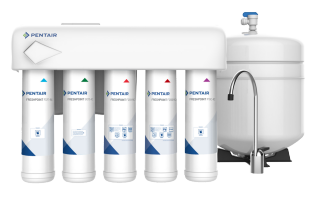Stop Wasting Water and Money. FIND A LOCAL PRO
With all the recent discussions in the media about lead in drinking water, you might be wondering how exactly to reduce lead in your home water. Access to clean drinking water is fundamental for a healthy lifestyle, yet many households face the challenge of lead contamination due to lead service lines. Lead, a toxic metal that can seep into drinking water from plumbing, can contribute to health concerns, especially for children and pregnant women. Fortunately, modern water filtration technologies, such as Reverse Osmosis (RO) and carbon filtration, specifically Pentair proprietary Fibredyne technology, effectively reduce lead levels in home drinking water. Let’s explore how these technologies work to reduce lead in your water.
What is Reverse Osmosis (RO) Technology?
Reverse Osmosis is a water purification technology that uses a semi-permeable membrane to reduce impurities in water. During the RO process, water is forced through the membrane under pressure. This membrane has tiny pores that only allow water molecules to pass through while filtering larger contaminants, including lead, heavy metals, and sediment.
New to reverse osmosis? Our article "Learn about Reverse Osmosis" breaks down the basics.
The RO Process
1. Pre-filtration: Before the water enters the RO membrane, it typically goes through a pre-filter that removes larger particles and sediment.
2. RO Membrane: The heart of the system, this membrane blocks contaminants like lead while allowing clean water to flow through.
3. Post-filtration: After passing through the RO membrane, water often flows through a final post-filter, usually carbon-based, to polish it and reduce any remaining tastes or odors.
Reverse Osmosis systems can only be installed under your sink via a multi-step filtration system, storage tank, and dedicated side faucet. These systems connect directly to your cold water line, making them effective for drinking and cooking.
What Is Carbon Filtration and Fibredyne Technology?
Carbon water filtration uses activated carbon to effectively reduce various contaminants in drinking water. The highly porous nature of activated carbon allows it to adsorb various substances over long periods of time. This process enhances water quality and taste, making it cleaner and more pleasant to consume . Fibredyne is a proprietary Pentair technology that combines powdered activated carbon and fibers to create a highly efficient carbon filter. This carbon filtration system excels in sediment holding capacity while effectively reducing contaminants, including lead. Fibredyne is an industry-leading filtration technology and can only be found in genuine Pentair products. Typically, these filters drop into a water filtration housing, which is installed on your home's water line. This makes maintenance quick and easy and provides cleaner water to your entire home.
What is The Best Solution for Your Home?
RO systems often require a separate faucet to be installed on your countertop and space for the filters and tank under your sink, but they provide quick access to cleaner drinking water. They are also often certified to reduce more contaminants than just lead. Fibredyne and carbon filters are typically whole-home solutions, providing cleaner water everywhere you need it, though they are typically only certified to reduce a few specific contaminants. These often require professional installation but are easy to maintain on your own.
No matter what solution you choose, make sure it’s certified by an independent testing organization for lead reduction, such as NSF. As water quality concerns continue to grow, it’s key to stay informed about the solutions available. Embrace the peace of mind that comes with cleaner, fresher drinking water—your health will thank you! Connect with a local water treatment pro and ask for Pentair today!
What's in your water?
start here
Worried about what may be in your water? Get our water test kit and send it in to us! We do extensive testing and will recommend products based on the makeup of your water. Get a test today!
*Please note that this water test kit does not test for PFAS.






